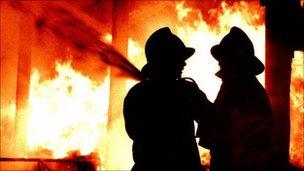Fire service revamp costing taxpayers millions
- Published

Plans to regionalise the fire service have been scrapped by the new government
Millions of pounds are being wasted on unused fire engines and unoccupied new control centres as part of a revamp of the fire service, the BBC has learned.
Nine new regional control rooms were built in England as part of a £423m project to regionalise the service.
But the centres are standing empty, at a cost of £1m rent a month, because of problems with their computers and may now not all be needed.
The coalition government has decided not to proceed with regionalisation.
BBC Radio Four's Face the Facts also found that expensive equipment bought by fire brigades to replace current engines remained unused.
Over-budget
The nine regional centres were built as part of plans to replace 46 local fire control rooms in England, with an original budget of £70m, and create a national interlinked service that could direct fire brigades to the scenes of large emergencies more easily.
However, under new coalition government plans, the 46 local centres will still be replaced, but there will no longer be regionalised local fire brigades; instead they will remain under local control.
The nine centres have been standing empty for up to three years because of problems in developing their computer systems.
The monthly rent for the empty buildings is costing taxpayers £1m a month, and they will not be all in use until 2013, sending the programme more than £350m over budget.
Defence contractor EADS was hired in 2007 to install the computer systems in the centres, as well as in 1,400 fire stations and 3,400 fire engines, providing an interlinked response service.
Labour MP Clive Betts, the current chairman of the Commons communities and local government select committee that has investigated the delays, said the project had been "almost an unmitigated disaster throughout the course of its life".
"But the reality was that, when you consider cancellation costs, it was less costly to continue with it than it was to cancel it," he said.
The select committee criticised the government for having a high turnover of staff working on the project and a reliance on consultants.
John McDonnell MP, chairman of the Fire Brigades Union parliamentary group, agreed that the waste could have been prevented.
"It is almost Yes Minister-ish. It is very difficult for senior civil servants, ministers and secretaries of state to admit they have made a mistake," he said.
"What usually happens is rather than admit a mistake they throw more money at it and try to save the phenomenon."
EADS admitted the project had "birth pangs", but said it was now on course.
As part of money-saving proposals, EADS has recommended that the project could be carried out using fewer regional centres.
Its chief executive Robin Southwell said: "We believe the number can come down significantly, saving maybe hundreds of millions of pounds.
"Any of those buildings not being used could be adapted for other uses."
The government has so far not responded to EADS' proposals.
Weight problem
BBC Radio Four's Face the Facts also found that some brigades in the UK are selling unused, brand new fire engines.
Central Scotland fire brigade bought two combined aerial rescue pumps (Carp engines) in 2008 at £400,000 each, which it later found were too heavy for UK roads.
Chief fire officer for Central Scotland Kenny Taylor said: "Very early on it became clear there was a problem. When the engine became kitted it was substantially overweight."
Central Scotland has now put the engines up for sale on the internet at just under 300,000 euros (£246,000) each.

The nine regional centres are standing empty at a cost of £1m a month
The manufacturers are in dispute with the fire brigade, saying the vehicles were made to the right specification. They believe they are not being used because of internal problems in the fire brigade.
They suggested a solution for the use of the vehicles, but have not had a response.
But other brigades have had problems with this type of new vehicle, supplied by different manufacturers.
Humberside fire brigade spent almost £60,000 converting its Carp engine back to a single rescue platform fire engine and does not know when it will come into service.
South Yorkshire, which brought four Carps in 2008, has sent them to the Netherlands for £600,000 worth of remedial work. The manufacturers of its vehicles have gone into administration.
'Exhausted, disappointed'
The fire minister Bob Neill told Face the Facts: "The government is committed to ensuring value-for-money for the taxpayer and better procurement is vital."
The president of the Chief Fire Officers' Association, John Bonney, is frustrated, blaming the government and contractors.
"There has got to be a bit of a knocking of heads together," he said.
"It is not just money but it's been investment of a lot of time and energy by the fire and rescue service. We feel exhausted and disappointed.
"Unfortunately, certainly at the early stages... it became a discussion between the primary contractor and government officials rather than the professionals."
Listen to Face the Facts on BBC Radio 4 at 1230 BST, on Thursday, 26 August, repeated at 2100 BST on Sunday, 29 August, or on BBC iPlayer